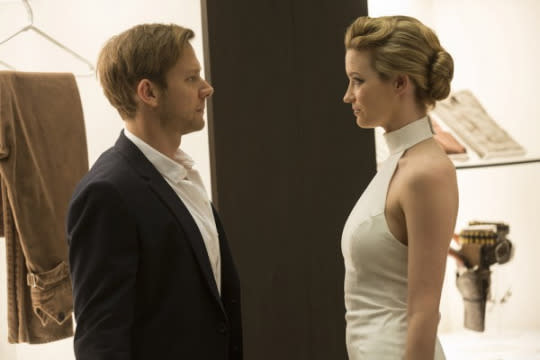Westworld - A mightily impressive sophomore offering takes off with a compelling look at another sentient host

“Chestnut” - EPISODE REVIEW

*****SPOILERS FOLLOW*****
Westworld is a big place with a small history. Whether guests have been popping in and out of the park for more than 30 years (like The Man in Black, who I will now refer to as MIB) or are visiting its rich trappings for the first time (like William, who’s played by Jimmi Simpson), those who invest in the wild west experience will always have the power to create their own stories - but those stories usually remain more or less as talking points for conversations after folks have gone home. Like the pilot for Westworld established, the hosts populate the theme park everyday, but regardless where their stories take them the memories literally aren’t built to last. With their memories erased every day, they’re programmed to live in this fictitious world purely to amplify the aesthetic, nostalgia and/or pleasure the guests seek. Any deviation from that formula, any inclination of a free will, and the programmers are always willing to replace their models and rewrite the script.
If last week’s pilot was meant to introduce us to this intriguing human/robot dynamic and the backdrop in which it exists, then “Chestnut” begs us to wonder what that dynamic means to both the guests and the hosts. Dolores catches a brief vision of what looks like the aftermath of last week’s shootout, and when she utters to Maeve that “these violent delights have violent ends”, Maeve begins to spiral out of control. Memories of her own past start to spring to mind, her behaviors with the guests and other hosts fall off-script, and once her behavior is modified to have a more aggressive approach the programmers behind the scenes decide to bring her in and troubleshoot. Through Maeve, Westworld confirms that the hosts, one way or another, will be cognizant of their pasts. How this threatens to dampen on the theme park experience is also explored through the subtleties in Maeve’s varying degrees of conduct, which is touched on beautifully in two eerily similar instances in which she elects to sexually engage with a guest in one, and offers a different guest to Clementine in another. The startling brutality of her past - coupled with the undisclosed uncertainty behind her encounter with MIB - injects a profound humanity that’s reflected in her recent behavior, and I can’t help but wonder if that played a part in her breaking out at the lab; a particularly chilling scene elevated greatly by the fear portrayed in Thandie Newton’s performance.

To sum it all up for Maeve: the fact that she simply acknowledges her past scares the s%^& out of the programmers who maintain the hosts, and Quality Assurance in general. Once a host begins to connect to prior stories and rejects the standard protocol, all bets are off and anything can happen. As a result, Maeve, like Dolores in a way, represents both the evolution and the gradual straining of host control that the creators are tirelessly striving to withhold. Well, most of them anyway; Ford in particular doesn’t seem very bothered by the sudden reports. In fact, the conversation he has with the child host in the desert suggests that he prefers the sentient value the robots gather from past experiences. I wouldn’t bank my life savings on that notion, but if the cross we see at the very end of “Chestnut” is supposed to lead to anything of importance it might mean that Ford has an eye on birthing a new domain within the theme park catering to the emotional development of these hosts.
So, right off the bat, Westworld has fired up the kettle and is brewing a pair of new, potentially juicy conflicts - but what does that mean elsewhere? MIB’s latest shenanigans are fueled by his incessant search of a “maze”, where he stabs and shoots his way to previously uncovered answers. Once again, he seems to relish in the familiarity of gunning down mobs of armed hosts with ease, but because of his fascination behind this maze we actually have some context to work with. At the moment, MIB wants to strip Westworld to its core, and reach the supposed “next level”. This could mean a number of things, since he’s effectively altered multiple storylines within the park but indicates the tedium of doing so. I’m under the impression he’s staging a revolution of his own. Last week, he triggered Dolores’s sensitivity to the dreams she started to recollect, which more or less aided in her re-imagining past events like those dead bodies she envisioned. With Lawrence, the host he rescues from execution, he’s trying to teach the influence pure suffering could have on anyone with sentience. That could very well be why he keeps Lawrence alive after basically erasing his entire family, and subsequently drags him along for the rest of his journey. Perhaps he’s hoping that this fresh, new experience this host has just witnessed may be the catalyst towards expanding his and other hosts’ emotional palettes?

Like MIB, newcomers William and Logan seek enlightenment in their Westworld adventures. Although the latter character is more of a dispensable jerk who’s mostly limited to freely releasing his sexual urges, the former guest emulates the fascination and bewilderment any one of us would have entering a theme park of this magnitude for the first time. The contrast between both gentlemen is stark, and the episode - particularly in the bar sequence - does an excellent job indicating the different kinds of experiences these separate attitudes could lead to. In William’s case, you just have to be curious of the real life he’s escaping. While Logan passionately undertakes in sexual activity with the brothel hosts, William elects to engage in heartfelt conversation with Clementine, mentioning that he has someone real waiting for him back home. It’s a scene that begs the viewer to ask why he’d even come along with Logan in the first place, but it plays into his encounter with Dolores at the end of the episode. If he’s content with the reality he’s temporarily withdrawn from, then what does he expect to get out of conversing with soulless droids? For that, William instantly comes off as a mysterious-yet-fascinating figure, although my assumptions lie heavily on a potential love triangle between him, Dolores and Teddy.
Here are a few extra notes I have in regards to this week’s episode:
This week’s Behind the Scenes in Westworld includes: Bernard talking to Dolores in secret, Ford graciously turning down Lee’s hilariously zany new narrative proposal (proudly titled “Odyssey on Red River”), Elsie tinkering with Maeve so that she’s less “welcoming” with the guests, and Bernard getting kinky with Theresa.
I love how Lee’s narrative and Ford’s rejection of the narrative ties the episode’s themes together. Ford’s belief that the guest “already know who they are” and want a “glimpse of who they could be” (brilliantly spoken by Anthony Hopkins, by the way) subtly echoes William’s gut feelings, Maeve’s pondering of her memories, and the emotions MIB has sprung from the hosts he’s crossed paths with. It even forecasts the direction this season is indisputably heading toward.
My favorite lines from the episode:
“Are you real?”
“Well, if you can’t tell, does it matter?”
________________________________
“We practice witchcraft. We speak the right words. Then we create life itself out of chaos.”
I think we need more scenes like the one where that guest outright murders Teddy for pure enjoyment (“Now that’s a F&^%$#* vacation!”) if only because it reminds us of the unpredictability the real human beings represent throughout the theme park.
It appears that Dolores’s memories have led to her discovery of a firearm dug up somewhere in the park. We don’t know for sure if this one of the hosts’ prop guns or a real, live one, but I’m willing to safely bet on the latter scenario being the case.
The Verdict:
By shifting the focus from Dolores to Maeve, Westworld cashes in on an opportunity to further explore the emotional depths of the hosts without repeating the narrative of the pilot. It also continues to shine elsewhere, with Ford having a lightbulb moment while venturing around his theme park, and the Man in Black pursuing a maze that supposedly has the answers he’s looking for. What impresses me most about the show so far, however, is its impeccable coherence. Even with William and Logan introducing the human aspect of visiting Westworld, the argument surrounding the robots’ sentient limits remains central to practically every plot point in motion. So far, so (very, very) good.
RATING: 9.3
+ Maeve’s plight, and the nightmares she can’t shake off
+ William and his bewildered fascination with Westworld
+ Ford’s cooking up a new narrative for the park
+ Man in Black’s search for “The Maze”


 Yahoo News
Yahoo News 